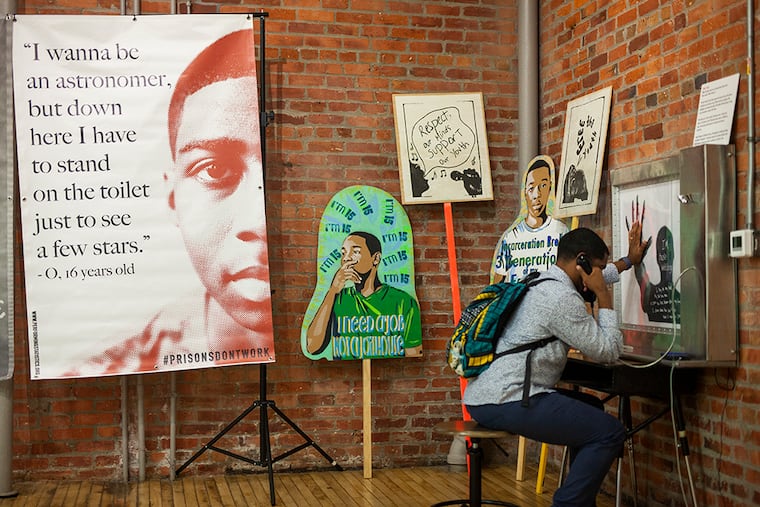Philly’s youth deserve opportunities, not abusive prisons | Opinion
Philly's youth have a vision to fix a justice system that has failed them. It's time we listen.

Recently, Governor Tom Wolf announced much-needed reforms to Pennsylvania’s broken youth justice system — giving welcome relief to our state’s most vulnerable children. The governor’s move, a response to the uncovering of violence against children at the Glen Mills schools, would increase transparency for state agencies and reduce the number of children in institutional placements. These changes are crucial.
Each year, Pennsylvania spends up to $200,000 to incarcerate a single child — over three times the tuition at the University of Pennsylvania. The huge price tag doesn’t come with positive outcomes. Young people who are locked up struggle academically, psychologically, and even physically.
For years, I’ve worked to create a sense of community and belonging among our city’s youth and organizations that service them. I’ve seen firsthand that youth have, or desire, the knowledge to make change. Further, they overwhelmingly have the will to fight for that change. I’ve also seen adults struggle to listen to young people and honor their lived experiences. It’s an unfortunate by-product of two factors: 1) adults are often far removed from the direct impact of the issues plaguing our youth and 2) all humans must contend with unconscious biases (age, class, race, gender, and the like).
This makes the most noble of intentions difficult to assess for harm and impact without personal feelings becoming entangled. To solve this, adults have to depersonalize attitudes toward policy decisions and focus on their impact.
The faraway placements our state has relied on disconnect youth from their support networks, expose them to trauma and violence, and don’t make our communities safer. The mental suffering, abuse, and neglect plaguing Pennsylvania’s current youth justice model is well-documented, such as documented by The Inquirer at Glen Mills Schools. The horrifying accounts found that included youth were subject to broken bones, choking, and beatings at the hands of the staff entrusted with their care.
No one should be locked up and traumatized for skipping class. Yet 1 in 3 youth locked up in Pennsylvania are there for status offenses and probation violations, such as truancy or running away — one of the highest rates in the country.
Our broken system is even harsher on youth of color. At least 80% of the kids Philadelphia locked up are youth of color, and statewide, black children make up more than half of youth in residential facilities. Over-policing and over-surveillance of communities of color persist despite evidence that all youth misbehave at similar rates.
These disturbing stories and facts led to the creation of the new Office of Advocacy and Reform, with a new Child Advocate position. The 25-member Council on Reform was also established to provide a comprehensive review of the state’s laws and policies, and make recommendations for changes by Nov. 1. For starters, the council Council should end contracts with private placements outside of the city and redirect resources from these contracts to bring young people home. The millions of dollars spent on prisons should be reinvested in a full range of supports and opportunities for youth.
It’s not only more effective, it’s what our state wants.
According to a poll released this year, 8 in 10 Pennsylvanians support a restorative approach and endorse financial incentives for municipalities that invest in alternatives to youth incarceration, such as intensive rehabilitation, education, community services, job training, and programs that provide youth the opportunity to repair harm to victims and communities.
Other states have seen results. Since enacting reforms that restrict out-of-home placement in 2016, for example, Kansas saw a 63% drop in youth committed to out-of-home facilities from 2015 to 2018, while youth arrests declined 29% from 2015 to 2017.
And when New York City stopped sending youth to state facilities, instead placing them in limited secure and nonsecure homes of 6-18 youth, those youth saw extremely positive changes: 91% passed their academic classes; 82% were able to transition back to a parent, other family member, or guardian; and 91% were enrolled in pro-social community-based programs when leaving care.
Philadelphia youth know there’s a better way. That’s why, with the support of more than 20 community organizations, they rallied in the city to offer a new vision, made public in May, on how to best end the institutionalization of Philadelphia’s young people.
This is our chance to make fundamental change. Philadelphia should prioritize programs that protect our youth and help them succeed, attending to their developmental needs and opportunities for growth and change. Now is the time to listen to the voices of the most impacted and implement true youth justice reform.
Mike O’Bryan is director of Young Adult Initiatives at the Village of Arts and Humanities, Urban Innovation Fellow at Drexel University’s Lindy Institute, and Corzo Fellow at the Corzo Center for the Creative Economy.